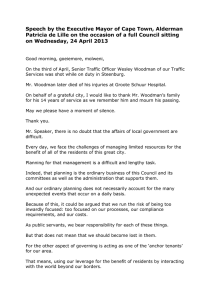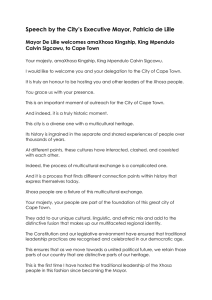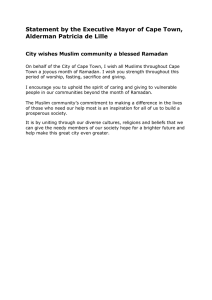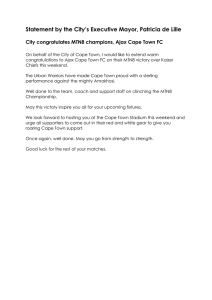Speech by the Executive Mayor of Cape Town, Alderman
advertisement
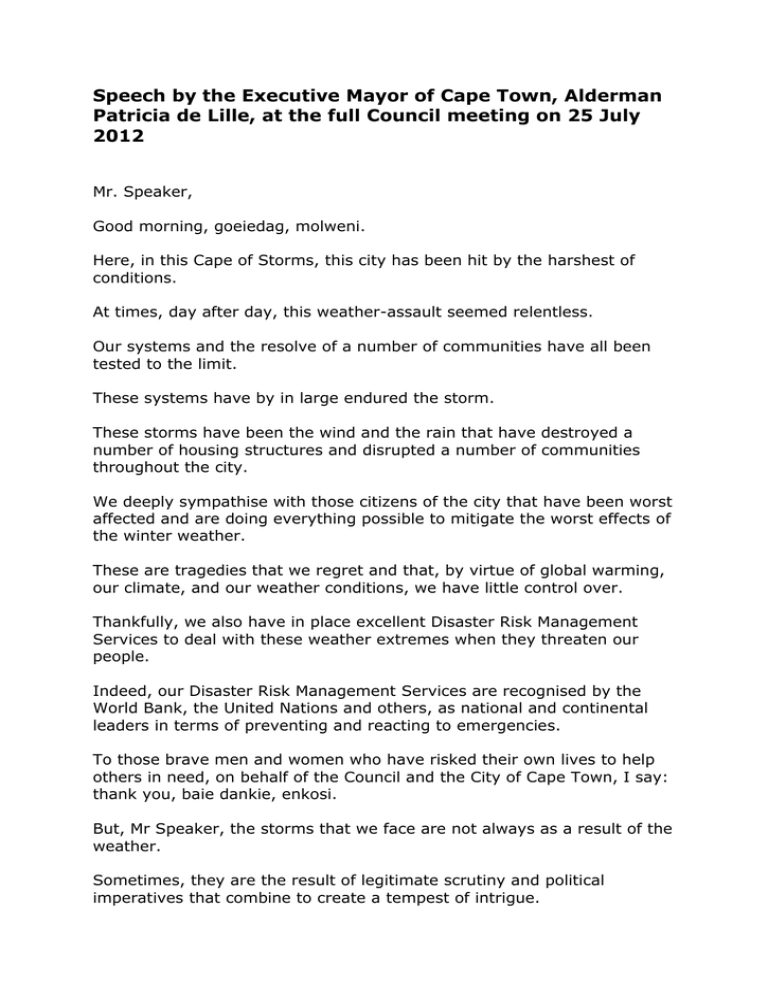
Speech by the Executive Mayor of Cape Town, Alderman Patricia de Lille, at the full Council meeting on 25 July 2012 Mr. Speaker, Good morning, goeiedag, molweni. Here, in this Cape of Storms, this city has been hit by the harshest of conditions. At times, day after day, this weather-assault seemed relentless. Our systems and the resolve of a number of communities have all been tested to the limit. These systems have by in large endured the storm. These storms have been the wind and the rain that have destroyed a number of housing structures and disrupted a number of communities throughout the city. We deeply sympathise with those citizens of the city that have been worst affected and are doing everything possible to mitigate the worst effects of the winter weather. These are tragedies that we regret and that, by virtue of global warming, our climate, and our weather conditions, we have little control over. Thankfully, we also have in place excellent Disaster Risk Management Services to deal with these weather extremes when they threaten our people. Indeed, our Disaster Risk Management Services are recognised by the World Bank, the United Nations and others, as national and continental leaders in terms of preventing and reacting to emergencies. To those brave men and women who have risked their own lives to help others in need, on behalf of the Council and the City of Cape Town, I say: thank you, baie dankie, enkosi. But, Mr Speaker, the storms that we face are not always as a result of the weather. Sometimes, they are the result of legitimate scrutiny and political imperatives that combine to create a tempest of intrigue. Mr Speaker, a week ago, we revealed our provisional financial results for the previous financial year. These results showed that our capital expenditure was R4,17 billion, which amounts to 91,4% of the total capital budget that was R4,56 billion. Furthermore, R242 million, comprising a further 5,3% of that budget has been committed and will be completed in the next few months. The remaining 3,7% resulting from contracts that ended up costing lower than expected will go towards savings. This is a tremendous achievement, not just for local government, but for government as a whole and for the country. Time and again, surveys and studies have shown that South Africa has under-invested in infrastructure and capital spending over the past two decades. This opinion finds agreement across the private sector and to the longterm public sector thinking of the country in the National Development Plan. It has been identified by President Jacob Zuma and was a major theme in his last State of the Nation Address. Cape Town is doing its part. We are investing in the capital projects that build roads; lay the networks for reliable supplies of water and electricity; build community facilities; install bulk infrastructure; and much else besides. These are the projects that build the city of the future and create opportunity for all, especially following the strategy of infrastructure-led growth. But the rainmakers in the ANC have to try and create a storm: a storm in a teacup that is made all the worse by their thorough misunderstanding of government processes. That is how they see opposition. So the ANC claim that we are not measuring our expenditure against the right budget. They claim that the City is using a different budget and that because of this, somehow, the City is misrepresenting its finances to the people of Cape Town. We have measured our expenditure against the final, approved budget – the Adjustment Budget – approved in January, in line with the regulations of the Municipal Financial Management Act (MFMA). The MFMA is legislation that was passed by Parliament with an ANC majority. I challenge the ANC today to show us the clause in the MFMA that says that a municipality cannot adjust its budget. Indeed, I note that the MFMA defines an approved budget as one that, I quote ‘has been approved by a Municipal Council…and includes such an annual budget as revised by an adjustments budget.’ End quote. We have measured against the final approved budget, in line with regulations from the National Treasury. The Treasury is a department within an ANC National Government. Let me remind this Council that it is also the practice of the ANC national government, and ANC-run municipalities, to measure spending figures against the latest, revised budget. So if the ANC in this Council rejects our capital spend, then they also reject the laws and practices of this country. In which case, I hope that these rainmakers find themselves redeployed by more senior comrades to make storms elsewhere. The fact is, the City of Cape Town remains a performance leader in terms of municipal governance. Our financial practices and procedures have consistently resulted in unqualified audits – a status which most ANC-run municipalities have failed to achieve if we consider the recent report of the Auditor-General following up on ‘Operation Clean Audit.’ Mr Speaker, the City of Cape Town remains committed to the very best government practices. That is why the Mayco and I have started going back to communities to present the Integrated Development Plan (IDP) that this Council passed this year. We have already had a report back session with the community of Mitchells Plain and we will continue these engagements from Atlantis to Khayelitsha. We are reporting back on our five-year plan, giving a strategic policy overview of our delivery agenda, it was informed by a public participation process that reached over one million people. And that engagement with communities is one that we will always maintain, to ensure that we continue to govern according to the mandate of the people of Cape Town. We must do everything to ensure that our mandate remains as inclusive as possible and that it incorporates as many people in our communities as we can. This spirit must infuse everything we do, including addressing major criminal and social problems, which are inter-related. In that regard, I believe that all partners should be proactive in tackling the scourge of drugs and gangsterism in some of our communities. This includes, in the short-term, addressing direct criminal problems with partners in the South African Police Service (SAPS). It also includes a long-term approach in revitalising these communities through City services. We all have a role to play. That is why I recently met with the new National Police Commissioner, General Riah Phiyega, and we agreed that both the SAPS and the City, and indeed all of us, must work to address this problem. It is truly a ‘Whole of Society’ approach. Indeed, from the City-side, we have launched the ‘Don’t Start, Be Smart,’ Campaign, which is taking the lessons of leading a positive lifestyle directly to our youth. Mr Speaker, at the next Council meeting, for Council’s record, we will bring notification of the Service Delivery and Budget Implementation Plans (SDBIPs), which give life to the five pillars of the Opportunity City; the Safe City; the Caring City; the Inclusive City; and the Well-run City. They will be the tools that ensure that the organisation is working to change this city by providing opportunity and thus working to achieve redress and reconciliation. Indeed, I believe that reconciliation is another area where the City of Cape Town is taking the lead to bring healing to people who were historically divided. One of the key interventions we have made is to change the spaces in which people live by considering renaming old spaces where necessary and, more importantly, giving names to new places in the city. In that regard, our street naming and renaming process has been, I would argue, the most sensitively handled in the country. It has been one of constant participation, consultation and deliberation. All voices will be heard and views considered. With the names that the committee has suggested be put forward, we will strike a balance between recognising our past, acknowledging our shared heritage, and shaping a new future together. It is this spirit of engagement that speaks to the very heart of the Inclusive City. But inclusion must go beyond the symbolic. As meaningful as gestures are, they can never be the whole story. We must not rest until this whole city is united, socially as well as physically. It is for this reason that, though I recognise the right of Golden Arrow to take legal action, I am disappointed at Golden Arrow’s impending legal action questioning the terms we agreed to with various partners, including them, regarding the roll-out of the Integrated Rapid Transport (IRT) system. This kind of action is arguably anti-competitive given an entrenched transport monopoly that has lasted for decades in this city. This system, with its multiple modes of transport, its phases and its multiyear project-plans, has ambitions that reach well into our city’s future. Indeed, its success will be the building block of our city’s resilience and sustainability for decades. Because the stakes are so high, we will use every resource to fight for what this city needs in order to deliver a sense of inclusion and belonging to all who live in it. That is the responsibility we have to the people who live in this city at present and those who will live here in the future. But sustainability must also transform our energy usage in this city, which is the reason we have requested proposals from service providers for a roll-out of solar water heaters. The use of solar water heaters across Cape Town, which was an election commitment, is part of our commitment to reducing electricity consumption; supporting local economic development; and reducing the city’s carbon footprint. Indeed, it is a combined measure to achieve a balance of environmental and economic sustainability for the city as whole through a projected business-driven, City-supported roll-out of solar water heaters. Because, in conclusion, the storms we face are indeed sometimes of our own making, like some of the effects of climate change and historic patterns of energy usage. The real challenge comes in preparing for the storms that are the unintended results of our past behaviours and preventing unnecessary storms from developing. The wisdom for us all is knowing who the rainmakers are. Thank you.


